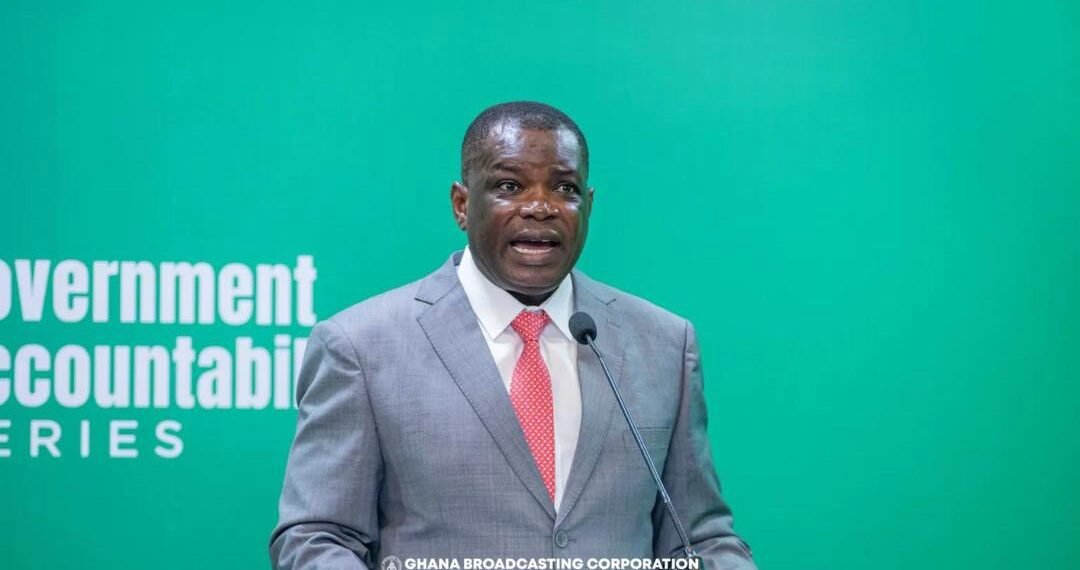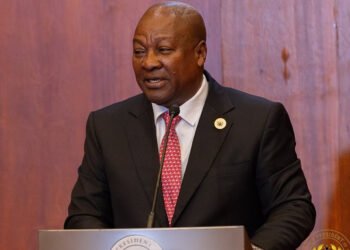Ghana’s Minister for Roads and Highways, Hon. Kwame Governs Agbodza, has announced a sweeping reform in how road maintenance is funded and executed across the country, following the recent passage of the Road Maintenance Trust Fund Bill by Parliament.
Speaking at the Government Accountability Series in Jubilee House, the Minister described the legislation as a key part of the Mahama administration’s “Reset Ghana” agenda aimed at ensuring equity, efficiency, and sustainability in national road infrastructure maintenance.
“Currently, one of the biggest problems we have in our country is the maintenance of our roads. Sometimes the road could be engineered, but just sections are in a state that needs repairs. We leave it, and the whole road gets deteriorated.”
Minister for Roads and Highways, Hon. Kwame Governs Agbodza
He explained that President John Dramani Mahama had directed the Ministry to address this systemic failure by reforming the existing Road Fund. The move, he said, is aimed at decentralising the management and disbursement of road maintenance resources and ensuring equitable access to funds for all districts across the country.
“In the past, the Road Fund existed mainly within the Roads Ministry under the office of the Chief Director. And it could happen that in a whole year, a minister could decide that a district will not see any release or any allocation for road maintenance. Rather, they will spend all the money in one location.”
Minister for Roads and Highways, Hon. Kwame Governs Agbodza
He pointed out that this ad hoc and sometimes politically skewed allocation process often deprived certain communities of critical road repairs, especially in rural or less politically significant areas.

Under the newly passed Road Maintenance Trust Fund Bill, all accruals to the Road Fund will now be subject to parliamentary oversight, similar to how other statutory funds like the District Assemblies Common Fund (DACF), Ghana Education Trust Fund (GETFund), and the National Health Insurance Levy (NHIL) are managed.
“Reset means that accruals to the Road Fund will now go to Parliament, and Parliament will apportion how the Road Fund is spent. Once this becomes law, every district in our country would have at least a minimum allocation for road maintenance every single year.”
Minister for Roads and Highways, Hon. Kwame Governs Agbodza
Local Participation
The goal, he said, is to institutionalise equity and transparency in road infrastructure financing. The Minister highlighted that the reform also ensures that decisions on which roads to maintain will be driven by local stakeholders.
“It is the stakeholders in the district that determine which roads are their priority to maintain at any particular time, based on the amount of money they have”.
Minister for Roads and Highways, Hon. Kwame Governs Agbodza
This shift, he emphasised, will enable communities to have a direct say in how road maintenance is prioritised, rather than being dictated from Accra.
He also drew parallels with earlier challenges under the Common Fund, where, despite the existence of a law, large portions of the funds—sometimes up to 70 per cent—were spent in the capital city. The new law, Hon. Agbodza assured, will ensure that road maintenance funds are fairly distributed and responsive to local needs.

Beyond equity and decentralisation, the Minister stressed that the Road Maintenance Trust Fund would also support job creation at the district level.
“We want these maintenance activities to be localised. I see no reason why in a district, we cannot find or groom or build the capacity of local people to learn how to do road maintenance in their district instead of importing service providers from other regions.”
Minister for Roads and Highways, Hon. Kwame Governs Agbodza
Hon. Agbodza believes this model will help foster technical skill development and empower small-scale contractors and artisans at the local level. “This will also create new jobs,” he said, highlighting the opportunity for employment generation through a well-structured maintenance program.
The Road Maintenance Trust Fund is among a series of infrastructure reforms being rolled out under the Mahama-led administration’s reset agenda, which seeks to correct historical imbalances in infrastructure delivery, promote regional equity, and improve accountability in government spending.
While the President’s assent to the bill is awaited, the Minister expressed confidence that the legislation will become a critical tool for improving the long-term resilience of Ghana’s road network.

“We are grateful that the Road Maintenance Trust Fund has been created,” Hon. Agbodza said, reaffirming the government’s commitment to fixing the broken road maintenance regime.
If fully operationalised as planned, the new framework could significantly transform how road infrastructure is maintained in Ghana—ushering in a more accountable, locally responsive, and economically inclusive approach to national development.
READ ALSO: UNICEF Warns Of Cholera Threat To Children






















